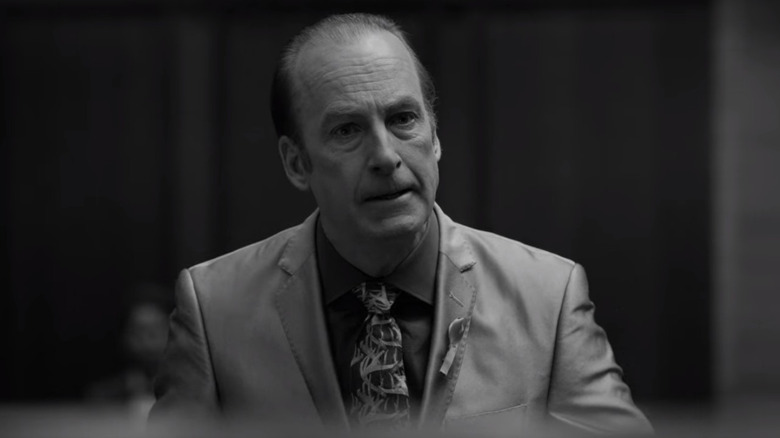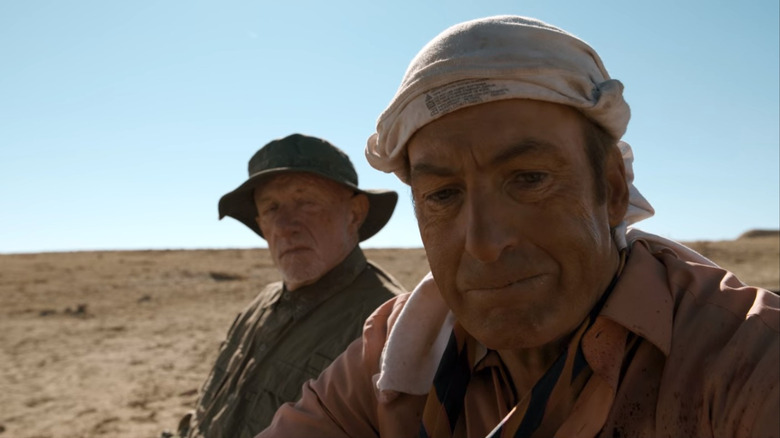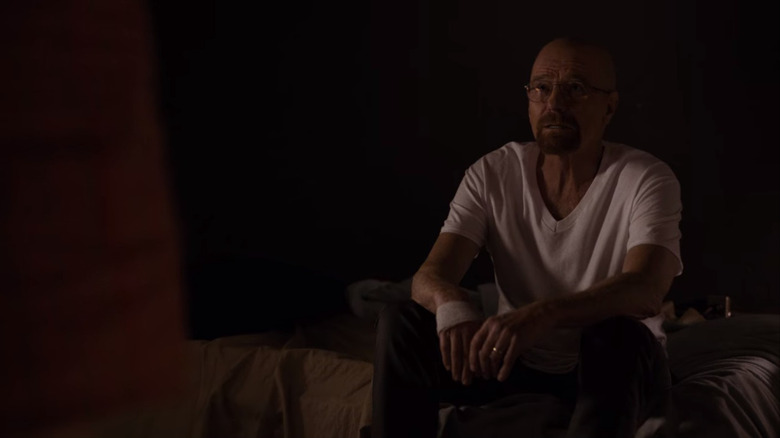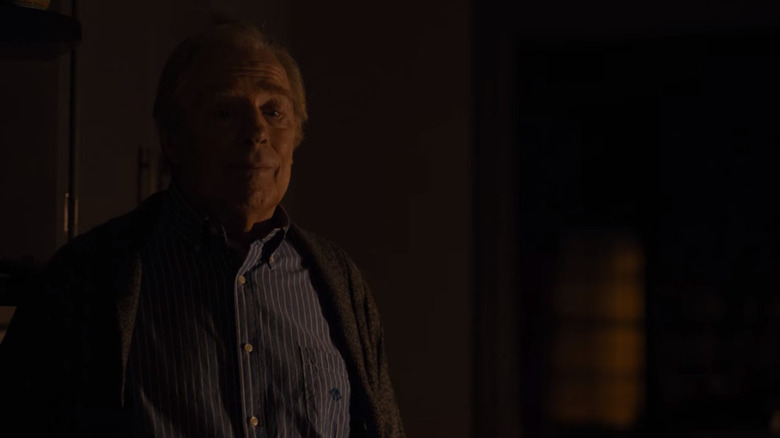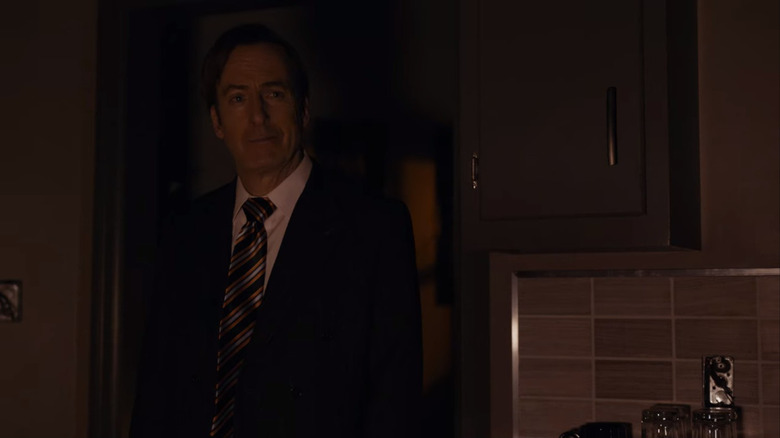A Guide To When Each Of Those Key Better Call Saul Flashbacks Take Place
Spoilers for "Better Call Saul" follow.
Who could have imagined, back when "Breaking Bad" was the reigning non-genre drama on TV, that almost a decade later we would be talking about a prequel focusing on the funny lawyer as one of the best TV shows of the decade, on par if not better than the original? "Better Call Saul" quickly proved to be more than just a spin-off of "Breaking Bad," but a show as complex, if not more so.
After six seasons, we finally said goodbye to James Morgan McGill, Kimberly Wexler, and the characters of the two-shows-and-a-movie universe with a perfect finale. After the previous episode ended with Gene on the run after being uncovered by Carol Burnett's Marion, the finale, aptly titled "Saul Gone," ties up loose ends, brings the themes of the show to the foreground and closes the book on Jimmy/Saul/Gene.
In between all of these, we also get a Dickensian series of flashbacks with ghosts of Saul Goodman's past, the three men who helped create Saul. These flashbacks and cameos are integral to the themes of the episode, and they take place at very different moments in the franchise's history. Here is a guide to exactly when the flashbacks take place and what they mean for the finale and Jimmy's story as a whole.
What would you do if you had a time machine?
The first ghost is that of Mike Ehrmantraut, in a scene that takes place between the end of the season 5 episode "Bagman" and the start of the following episode, "Bad Choice Road." This is when Jimmy and Mike got trapped in the desert after a shooting and had to walk for hours while Jimmy carried millions of dollars on his back to pay for Lalo's bail.
When they take a moment to rest, Jimmy decides to pass the time by asking Mike a hypothetical about what he would do if he had a time machine — thinking of him as a history buff. But rather than an answer Jimmy expected, like the Civil War or Ancient Rome, Mike surprises him by giving him a specific date in 2001 (presumably when his son, Matty, died) but right away Mike changes his answer. He settles on the day he took his first bribe.
Though he doesn't realize it then, this is a pivotal moment for Jimmy. After all, Mike (together with Nacho) is the man responsible for Jimmy getting involved with the criminal underworld. He is the man who connected Jimmy to Gus, and eventually helped Walter get involved with Gus.
To see Mike, who has a lot of money and power, talk about throwing it all away just like that is shocking to Jimmy at this point in time, but the audience knows better. To Mike, the moment he first took a bribe is the moment he set himself on a path that ended with his son dead, and him trapped in a life that revolved around a drug war and ended when a former chemistry teacher shoots him. This scene, and Mike's answer, are the first seeds of Saul's eventual death and Jimmy McGill's return in the finale.
So you were always like this
The second flashback centers on Walter, the monster that brought Saul down with him, the golden goose Saul used to become a millionaire despite Mike's warnings. The scene takes place after the events of "Ozymandias," right in the first act tease of "Granite State" when the late Robert Forster's Ed Galbraith leads Saul to his vacuum repair shop where Walt is already waiting for his new identity. This is also the place where we saw Saul for the very last time in "Breaking Bad."
In the scene, we see Walt resort to his old ways, obsessing over some stupid and small thing — a leaking pipe. When Saul asks him what he'd do with a time machine, Walt immediately dismisses it and starts talking about the implausibility of time travel. What Saul wants to know is if he has any regrets, Walt says — literally less than a day after he lost his family, his money, everything.
Where Mike knew where his life went wrong, recognized his mistakes, and instantly saw Walt for who and what he is, the man once known as Heisenberg is still delusional and lacking any self-awareness. He silently contemplates the watch Jesse once gifted him, but only gives a petty answer about not allowing his former friends to kick him off Gray Matter Technologies (which we know didn't happen this way). He blames everyone but himself for his problems, from Jesse to Skyler to the nazis. This is just like Jimmy is when he retreads into the Saul persona, blaming his problems on other people and avoiding responsibility. Walt represents the worst parts of Jimmy, obsessed with power and money, like the answer he gives Mike, and lacking responsibility, like when Saul answers Walt that he'd go back and prevent a slip and fall that messed up his knee.
If you don't like where you're heading, there's no shame in going back and changing your path
Just like in "A Christmas Carol," the last ghost ends up being the most significant and life-changing. In the case of Jimmy McGill, even if he denies having a serious regret he'd go back in time to change, his memories deceive him because we see the very moment where things could have gone drastically different.
The moment takes place quite literally the day before the first episode of "Better Call Saul," as Saul brings Chuck supplies now that he is living in his electricity-proof house, but the day before he surprises his big brother with a copy of The Financial Times — which is teased here. Though we've seen this interaction play out countless times in the earlier seasons of the show, we've never seen it play out exactly as it does here, with Chuck asking Jimmy if he wants to stay a little longer and just talk as brothers.
We've seen Chuck dismiss, belittle, and otherwise act spiteful toward his younger brother, but for one glorious and fleeting moment, he reached out and tried to form a genuine bond that was more than just family obligations ... and Jimmy declined. He knows Chuck, or at least thinks he does, and he doesn't want to go through the same motions as always, and just leaves.
But as Chuck walks away with a copy of H. G. Wells's "The Time Machine" it becomes clear that this is the moment Jimmy would revisit, this is the moment Jimmy desperately wants to change. That is because if he had stayed maybe his relationship with Chuck would have been different, and maybe Chuck would still be alive, and maybe Jimmy would have never become Saul and countless atrocities could have been avoided.
Saul gone
If there was a man who had a hand in Jimmy becoming Saul, it was Chuck. Jimmy became a lawyer in no small part due to a desire to gain his brother's respect. Jimmy left behind his family name in favor of Saul Goodman because of his brother. Jimmy blamed all of his problems on Chuck, because he wasn't able to open up to himself and confront his own mistakes.
Throughout the whole of "Better Call Saul," Jimmy McGill never spoke his truth, and always hid his true self behind excuses, behind cons. That all changes in the finale, thanks to these three ghosts, and thanks to Kim, who inspires him to finally open up, to finally own up to his mistakes and his choices, and once again embrace the name James McGill.
